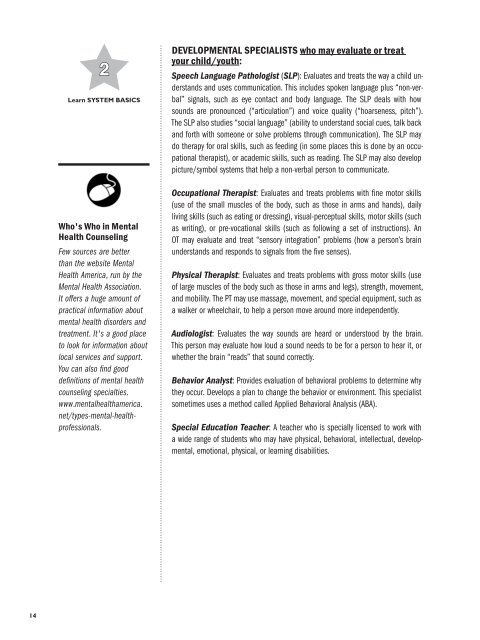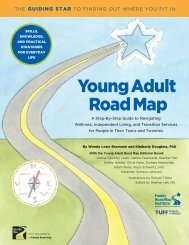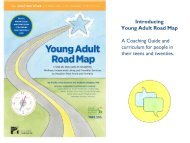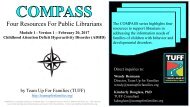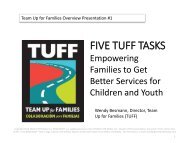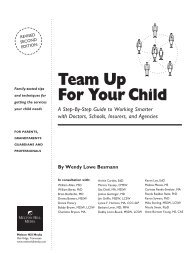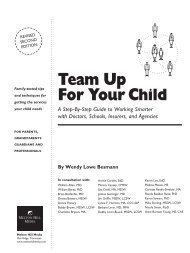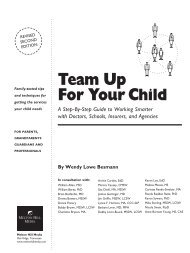Family Road Map Guide
You also want an ePaper? Increase the reach of your titles
YUMPU automatically turns print PDFs into web optimized ePapers that Google loves.
2<br />
Learn SYSTEM BASICS<br />
DEVELOPMENTAL SPECIALISTS who may evaluate or treat<br />
your child/youth:<br />
Speech Language Pathologist (SLP): Evaluates and treats the way a child understands<br />
and uses communication. This includes spoken language plus “non-verbal”<br />
signals, such as eye contact and body language. The SLP deals with how<br />
sounds are pronounced (“articulation”) and voice quality (“hoarseness, pitch”).<br />
The SLP also studies “social language” (ability to understand social cues, talk back<br />
and forth with someone or solve problems through communication). The SLP may<br />
do therapy for oral skills, such as feeding (in some places this is done by an occupational<br />
therapist), or academic skills, such as reading. The SLP may also develop<br />
picture/symbol systems that help a non-verbal person to communicate.<br />
Who's Who in Mental<br />
Health Counseling<br />
Few sources are better<br />
than the website Mental<br />
Health America, run by the<br />
Mental Health Association.<br />
It offers a huge amount of<br />
practical information about<br />
mental health disorders and<br />
treatment. It's a good place<br />
to look for information about<br />
local services and support.<br />
You can also find good<br />
definitions of mental health<br />
counseling specialties.<br />
www.mentalhealthamerica.<br />
net/types-mental-healthprofessionals.<br />
Occupational Therapist: Evaluates and treats problems with fine motor skills<br />
(use of the small muscles of the body, such as those in arms and hands), daily<br />
living skills (such as eating or dressing), visual-perceptual skills, motor skills (such<br />
as writing), or pre-vocational skills (such as following a set of instructions). An<br />
OT may evaluate and treat “sensory integration” problems (how a person’s brain<br />
understands and responds to signals from the five senses).<br />
Physical Therapist: Evaluates and treats problems with gross motor skills (use<br />
of large muscles of the body such as those in arms and legs), strength, movement,<br />
and mobility. The PT may use massage, movement, and special equipment, such as<br />
a walker or wheelchair, to help a person move around more independently.<br />
Audiologist: Evaluates the way sounds are heard or understood by the brain.<br />
This person may evaluate how loud a sound needs to be for a person to hear it, or<br />
whether the brain “reads” that sound correctly.<br />
Behavior Analyst: Provides evaluation of behavioral problems to determine why<br />
they occur. Develops a plan to change the behavior or environment. This specialist<br />
sometimes uses a method called Applied Behavioral Analysis (ABA).<br />
Special Education Teacher: A teacher who is specially licensed to work with<br />
a wide range of students who may have physical, behavioral, intellectual, developmental,<br />
emotional, physical, or learning disabilities.<br />
14


